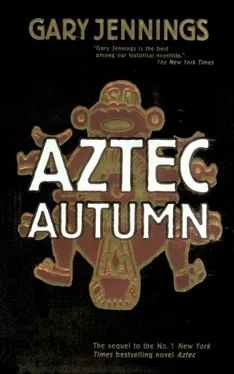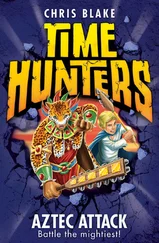Gary Jennings - Aztec Autumn
Здесь есть возможность читать онлайн «Gary Jennings - Aztec Autumn» весь текст электронной книги совершенно бесплатно (целиком полную версию без сокращений). В некоторых случаях можно слушать аудио, скачать через торрент в формате fb2 и присутствует краткое содержание. Жанр: Старинная литература, на английском языке. Описание произведения, (предисловие) а так же отзывы посетителей доступны на портале библиотеки ЛибКат.
- Название:Aztec Autumn
- Автор:
- Жанр:
- Год:неизвестен
- ISBN:нет данных
- Рейтинг книги:4 / 5. Голосов: 1
-
Избранное:Добавить в избранное
- Отзывы:
-
Ваша оценка:
- 80
- 1
- 2
- 3
- 4
- 5
Aztec Autumn: краткое содержание, описание и аннотация
Предлагаем к чтению аннотацию, описание, краткое содержание или предисловие (зависит от того, что написал сам автор книги «Aztec Autumn»). Если вы не нашли необходимую информацию о книге — напишите в комментариях, мы постараемся отыскать её.
Readers familiar with Mexican history will welcome the rich details of this vengeance drama; those new to it will be impressed by Jennings's exhaustive research.
Aztec Autumn — читать онлайн бесплатно полную книгу (весь текст) целиком
Ниже представлен текст книги, разбитый по страницам. Система сохранения места последней прочитанной страницы, позволяет с удобством читать онлайн бесплатно книгу «Aztec Autumn», без необходимости каждый раз заново искать на чём Вы остановились. Поставьте закладку, и сможете в любой момент перейти на страницу, на которой закончили чтение.
Интервал:
Закладка:
"They all do," said Cricket. "But only a very few have the right sort." She tilted her pretty head, gazing at me. "Your own heart, Tenamáxtli, it is for feeling emotions, yes? Like love?"
"So it seems," I said, and laughed. "It thumps more noticeably when I love somebody."
She nodded. "As does mine, when I look at my little Tirípetsi and feel love for her. But oysters do not all have hearts that know emotion as human hearts do. Most oysters just lie inert, and wait for the water currents to bring them nourishment, and aspire to nothing more than oyster-bed placidity, and do nothing but exist as long as they can."
I started to remark that she might be describing her own island sisters or, for that matter, the majority of humankind, but she went on:
"Only one oyster in many—perhaps one in a hundred hundreds—has a heart that can feel, that can want to be something more than a slime in a shell. That one oyster among so many, that one with a feeling heart, well, his is the heart that becomes a kinú, visible and beautiful and precious."
Surely that nonsense could be believed nowhere except in The Islands of the Women, but it was such a sweet fancy that my own heart would not let me dispute it. And, now that I think back, that must have been the moment when I fell in love with Ixínatsi.
At any rate, her belief in questing for unoysterlike oysters seemed to console her on those days when she might dive a hundred hundreds of times between first and last light, and bring up whole nations of oysters without a kinú among them. So she never once—as I would have done—cursed the oysters or the gods or even spat angrily into the sea when a whole day's work was done in vain.
And cursedly hard work that is, too. I know, for I tried it one day, in secret, in waters the women were not then working—staying underwater long enough to pry just one oyster off a rock down there. That was as long as I could stay. But the women begin their diving when they are mere children. By the time they are grown, they have so developed in the upper body that they can hold their breath and remain submerged for an astonishingly long time. Indeed, those women of the islands have bosoms more remarkable than I have ever seen elsewhere.
"Look at them," said Cricket, holding one of her magnificent breasts in either hand. "It is because of these that the islands have come to be the domain of women only. You see, we worship the big-bosomed goddess Xarátanga. Her name means New Moon, and in the arc of every new moon you can see the curve of her ample breast."
The similarity had never occurred to me before, but it is so.
Cricket continued, "New Moon long ago ordained that these islands should be inhabited only by females, and all men have respected that commandment, for they fear that Xarátanga would take away the oysters—or at least their valuable kinúcha—if any but women tried to harvest them. Anyway, the men could not do that. As you confessed to me, Tenamáxtli, you proved your own ineptitude at it. We women are fitted by New Moon to be superior divers." She jiggled her breasts again. "These help our lungs to be capable of holding much more air than any man's can."
I could not divine any connection between milk-giving and air-breathing organs, but I was no tícitl, so I did not argue the matter. I could only admire. Whatever extra function the women's breasts might or might not serve, their superb development and ageless firmness indubitably add to the women's handsomeness. And there is another thing that makes the islanders differ from mainland women, and makes them attractive in a striking way, but to explain that aspect I must digress slightly.
There are on those islands many other inhabitants besides the women. Various kinds of sea turtles lumber from shore to sea and back, and there are crabs everywhere, and of course there is a multitude of birds, raucous of voice and promiscuous of droppings. But the most distinctive creature is the animal the women call the pukiitsí, which is to say a sea-dwelling version of the beast called cuguar in Náhuatl. The name must have come down to them from their Michihuácan ancestors, for none of the islanders could ever have seen a cuguar.
The pukiitsí does vaguely resemble the mountain-dwelling cuguar, though its expression is not fierce, rather winningly mild and inquisitive. A pukiitsí is similarly whiskered about the muzzle, but its teeth are blunt, its ears tiny and its finlike paws are not killer-clawed. We of Aztlan saw these sea animals only rarely—when an injured or dead one washed up on our shores—because they do not care for sandy or swampy places, but prefer rocky ones. And we called them sea-does, simply because of their big, warm, brown doe eyes.
There might be hundreds of the sea-cuguars about The Islands of the Women at any one time, but they live on fish and are not at all to be feared, as real cuguars are. They would gambol in the waters right alongside the diving women, or lazily sun themselves on the offshore rocks, or even sleep floating on their backs in the sea. The women never killed them for food—the meat is not very tasty—but occasionally a sea-cuguar would die of some other cause, and the women would hasten to skin it. The glossy brown pelt is valued as a garment, both for its beauty and for its water-shedding properties. (Ixínatsi made me an elegant overmantle from one of the skins.) That coat of hair is dense enough that the sea-cuguars can live in the sea without their bodies ever getting cold or waterlogged, and the sleekness of the coat enables them to arrow through the water as swiftly as any fish.
The perpetually diving women have developed a trace of a similar coat. Now, I long ago made the point that our peoples of The One World are usually devoid of body hair, but I should amend that assertion. Every human being, even the newest and apparently hairless baby, wears an almost invisibly fine down over most of his or her body. Stand a naked man or woman between you and the sun and you will see. But the down of those island women has grown longer—encouraged, I imagine, by their having been sea divers for so many generations.
I do not mean that they are furred with coarse hair like that of white men's beards. The down is as fine and delicate and colorless as milkweed floss, but it covers their coppery bodies with a sheen like that of the sea-cuguars and serves the same purpose of making them more agile in the water. When an island woman stands with the sunlight falling from behind her, she is edged and outlined in shining gold. In moonlight she glistens silver. Even when she is long out of the sea and completely dry, she looks delightfully dewy, and more supple than other women are, and as if she could slip easily from the embrace of the strongest man...
Which brings me to the subject that had, all this while, been uppermost in my mind. I have mentioned the many generations of the women divers. But how did one generation beget the next?
The answer is so simple as to be ridiculous, even vulgar, even somewhat revolting. But I did not summon up enough nerve to ask the question until the night of my seventh day in the islands, on which day old Kukú had decreed that I must depart the next morning.
XXVI
I had finished cutting and shaping my paddle, and Ixínatsi had stocked my acáli with dried fish and coconut meat, plus a line and a bone hook with which I could catch fresh fish. She added five or six green coconuts from which she had sliced the stem end of each, so it remained closed only by a thin membrane. The heavy shell would keep the contents cool even in the sun; I had only to puncture the membrane to drink the sweet and refreshing coconut milk.
She gave me the directions which all the women had memorized, though none of them had ever had reason or wish to visit The One World. Between the islands and the mainland, she said, the tidal currents were always southerly, mild and stable. I was to paddle directly east each day at a steady but not overstrenuous pace. She rightly presumed that I knew how to maintain an eastward course, and she said that what southward drifting my acáli would do—while I slept at night—was allowed for in the instructions. On the fourth day I would sight a seaside village. Cricket did not know its name, but I did; it had to be Yakóreke.
Читать дальшеИнтервал:
Закладка:
Похожие книги на «Aztec Autumn»
Представляем Вашему вниманию похожие книги на «Aztec Autumn» списком для выбора. Мы отобрали схожую по названию и смыслу литературу в надежде предоставить читателям больше вариантов отыскать новые, интересные, ещё непрочитанные произведения.
Обсуждение, отзывы о книге «Aztec Autumn» и просто собственные мнения читателей. Оставьте ваши комментарии, напишите, что Вы думаете о произведении, его смысле или главных героях. Укажите что конкретно понравилось, а что нет, и почему Вы так считаете.











